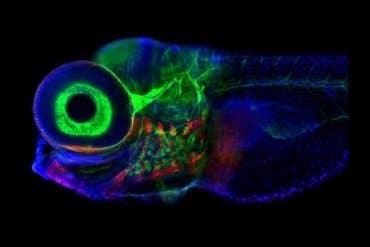Studying microbiomes in throat may help identify causes and treatments of brain disorder.
In the most comprehensive study to date, researchers at the George Washington University have identified a potential link between microbes (viruses, bacteria and fungi) in the throat and schizophrenia. This link may offer a way to identify causes and develop treatments of the disease and lead to new diagnostic tests.
“The oropharynx of schizophrenics seems to harbor different proportions of oral bacteria than healthy individuals,” said Eduardo Castro-Nallar, a Ph.D. candidate at GW’s Computational Biology Institute (CBI) and lead author of the study. “Specifically, our analyses revealed an association between microbes such as lactic-acid bacteria and schizophrenics.”
Recent studies have shown that microbiomes–the communities of microbes living within our bodies–can affect the immune system and may be connected to mental health. Research linking immune disorders and schizophrenia has also been published, and this study furthers the possibility that shifts in oral communities are associated with schizophrenia.

Mr. Castro-Nallar’s research sought to identify microbes associated with schizophrenia, as well as components that may be associated with or contribute to changes in the immune state of the person. In this study, the group found a significant difference in the microbiomes of healthy and schizophrenic patients.
“Our results suggesting a link between microbiome diversity and schizophrenia require replication and expansion to a broader number of individuals for further validation,” said Keith Crandall, director of the CBI and contributing author of the study. “But the results are quite intriguing and suggest potential applications of biomarkers for diagnosis of schizophrenia and important metabolic pathways associated with the disease.”
The study helps to identify possible contributing factors to schizophrenia. With additional studies, researchers may be able to determine if microbiome changes are a contributing factor to schizophrenia, are a result of schizophrenia or do not have a connection to the disorder.
Source: Emily Grebenstein – George Washington University
Image Source: The image is credited to Marco Castellani and is licensed CC BY-SA 2.0
Original Research: Full open access research for “Composition, taxonomy and functional diversity of the oropharynx microbiome in individuals with schizophrenia and controls” by Eduardo Castro-Nallar, Matthew L. Bendall, Marcos Pérez-Losada, Sarven Sabuncyan, Emily G. Severance, Faith B. Dickerson, Jennifer R. Schroeder, Robert H. Yolken, and Keith A. Crandall in PeerJ. Published online August 25 2015 doi:10.7717/peerj.1140
Abstract
Composition, taxonomy and functional diversity of the oropharynx microbiome in individuals with schizophrenia and controls
The role of the human microbiome in schizophrenia remains largely unexplored. The microbiome has been shown to alter brain development and modulate behavior and cognition in animals through gut-brain connections, and research in humans suggests that it may be a modulating factor in many disorders. This study reports findings from a shotgun metagenomic analysis of the oropharyngeal microbiome in 16 individuals with schizophrenia and 16 controls. High-level differences were evident at both the phylum and genus levels, with Proteobacteria, Firmicutes, Bacteroidetes, and Actinobacteria dominating both schizophrenia patients and controls, and Ascomycota being more abundant in schizophrenia patients than controls. Controls were richer in species but less even in their distributions, i.e., dominated by fewer species, as opposed to schizophrenia patients. Lactic acid bacteria were relatively more abundant in schizophrenia, including species of Lactobacilli and Bifidobacterium, which have been shown to modulate chronic inflammation. We also found Eubacterium halii, a lactate-utilizing species. Functionally, the microbiome of schizophrenia patients was characterized by an increased number of metabolic pathways related to metabolite transport systems including siderophores, glutamate, and vitamin B12. In contrast, carbohydrate and lipid pathways and energy metabolism were abundant in controls. These findings suggest that the oropharyngeal microbiome in individuals with schizophrenia is significantly different compared to controls, and that particular microbial species and metabolic pathways differentiate both groups. Confirmation of these findings in larger and more diverse samples, e.g., gut microbiome, will contribute to elucidating potential links between schizophrenia and the human microbiota.
“Composition, taxonomy and functional diversity of the oropharynx microbiome in individuals with schizophrenia and controls” by Eduardo Castro-Nallar, Matthew L. Bendall, Marcos Pérez-Losada, Sarven Sabuncyan, Emily G. Severance, Faith B. Dickerson, Jennifer R. Schroeder, Robert H. Yolken, and Keith A. Crandall in PeerJ. Published online August 25 2015 doi:10.7717/peerj.1140






